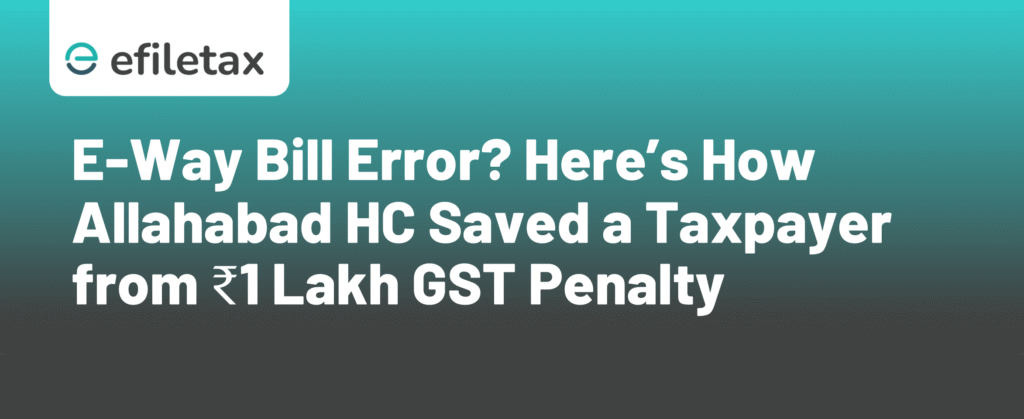
GST e-way bill error penalty quashed by Allahabad HC
The Allahabad High Court recently quashed a GST penalty imposed solely due to a technical error in the e-way bill. This judgment offers major relief to transporters and businesses penalised for procedural lapses despite genuine intent and valid tax compliance.
In this blog, we break down the legal reasoning, key takeaways, and what it means for Indian taxpayers.
Background of the Case
In M/s Varun Beverages Ltd. vs State of U.P. (Writ Tax No. 478 of 2023), the petitioner had a valid tax invoice and e-way bill. However, a minor mismatch in vehicle details led to interception and penalty proceedings under Section 129 of the CGST Act, 2017.
Key facts:
- Goods were in transit with valid documents
- E-way bill had a technical mismatch in vehicle number
- No intention of tax evasion
- Goods value and tax duly paid
The penalty of ₹1,54,407 was imposed despite genuine compliance.
Court’s Observation & Verdict
The Hon’ble Allahabad High Court held that:
- A minor technical error in the e-way bill does not amount to tax evasion
- Penalty under Section 129 requires mens rea (intention to evade tax)
- The taxpayer had valid invoices and paid tax, hence no loss to revenue
- The penalty was quashed, and authorities were directed to refund the amount if already recovered
Legal Reference:
- Section 129 of the CGST Act, 2017
- Rule 138A of CGST Rules – on documents required during movement
- Supreme Court in Hindustan Steel Ltd. vs State of Orissa (AIR 1970 SC 253) — penalty should not be imposed for technical or venial breaches
What This Means for Taxpayers
If your business faces penalties due to minor e-way bill errors but you’ve paid the correct tax and have genuine documents:
- You may challenge the penalty legally
- Use this case as a defence precedent in similar proceedings
- Mens rea is essential for penalty under Section 129
- Technical lapses must not be treated at par with tax fraud
Expert View: Don’t Skip Preventive Action
“While this judgment is welcome, don’t rely only on courts for relief. Businesses should invest in automated GST compliance tools to avoid data mismatches in the first place.”
— GST Consultant, Efiletax.in
Practical Tips to Avoid E-Way Bill Penalty
- Always reconfirm vehicle numbers before generation
- Use GST software that auto-fetches and validates e-way bill data
- Keep backup of tax invoices and e-way bills during transit
- Train your logistics staff on compliance basics
- If stopped, cooperate with officers and document everything
Keyphrase Subheading:
GST e-way bill error penalty and how to respond
- If penalty issued: file reply under Rule 142(1A)
- Include Varun Beverages judgment as citation
- Escalate via appeal under Section 107 if not resolved
- Consult a GST legal expert before payment under protest
Comparison Table: Technical Lapse vs. Tax Evasion
| Criteria | Technical Error | Tax Evasion |
|---|---|---|
| E-way Bill Present | Yes | No or falsified |
| Tax Paid | Yes | No or underpaid |
| Intent to Evade | No | Yes |
| Court Relief Likely? | Yes (as per HC ruling) | No |
| Penalty Justified? | No | Yes |
FAQ
Q1: Can penalty be imposed for wrong vehicle number in e-way bill?
A: Not if tax is paid, documents are valid, and there’s no intent to evade — as per Allahabad HC ruling.
Q2: What to do if I get a notice under Section 129?
A: File a reply with full documentation and cite relevant case laws like Varun Beverages Ltd.
Q3: Is this ruling applicable across India?
A: While it’s from the Allahabad HC, it carries persuasive value and aligns with Supreme Court’s stance on penalty laws.
Summary
The Allahabad High Court quashed a GST penalty imposed due to a technical e-way bill error, ruling that no penalty can be levied if there’s no tax evasion intent. This offers relief to compliant taxpayers facing procedural lapses in transit documentation.
Final Word
This ruling is a strong reminder that procedural compliance should not override substantive justice. But the safest route is to avoid mistakes altogether.
Use Efiletax for foolproof GST compliance — from automated e-way bill generation to legal response support.